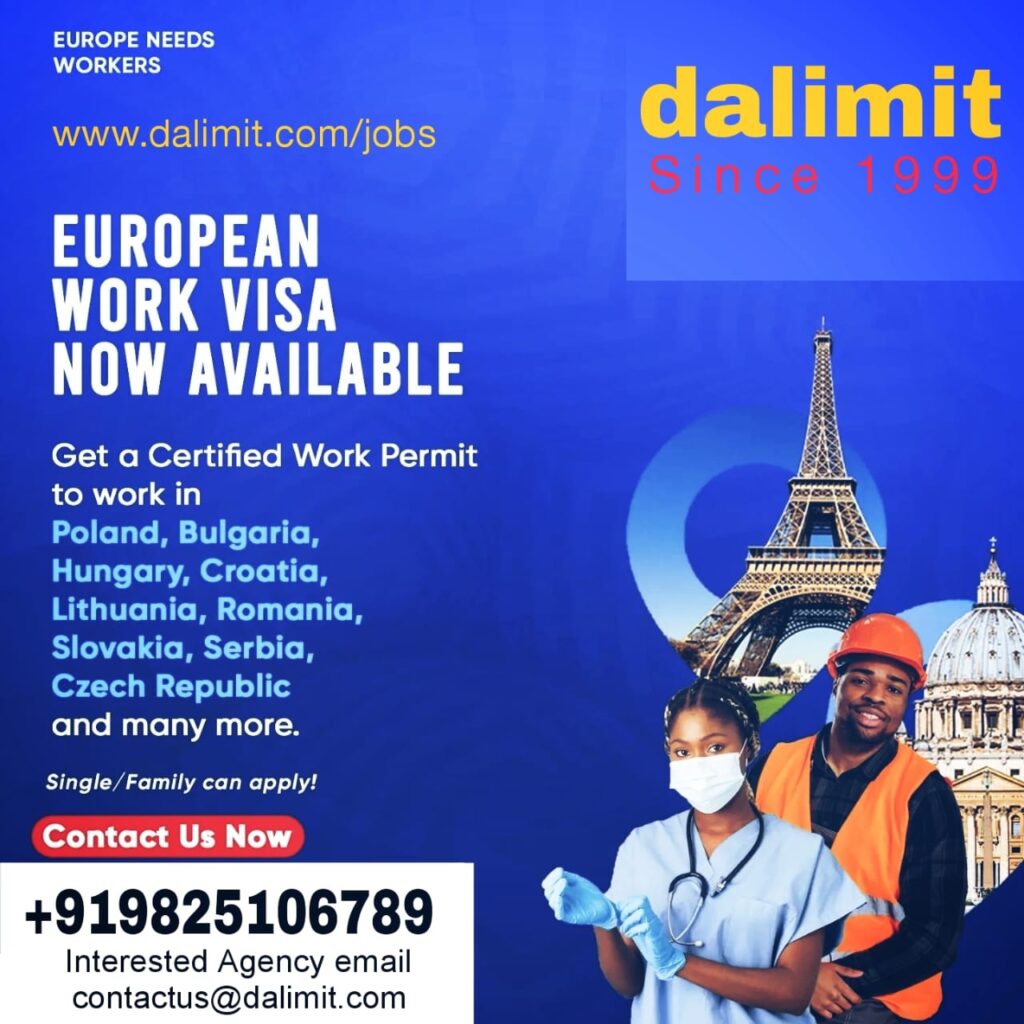
Looking for a work permit in Europe? Apply today!
1. Poland:
- Eligibility: Citizens of non-EU/EEA countries need a work permit.
- Types of Work Permits: There are various types based on job type and employer. The most common is the Type A permit for those employed by a Polish employer.
- Process: The employer applies for the work permit on behalf of the employee. The employee then applies for a visa or residence permit to enter the country.
- Duration: Typically valid for 1 to 3 years, depending on the job and employer.
2. Bulgaria:
- Eligibility: Non-EU/EEA citizens need a work permit to work in Bulgaria.
- Types of Work Permits: The most common type is the Bulgaria Type D visa for employees.
- Process: The employer submits an application to the Employment Agency. If the application is approved, the foreign worker can apply for a visa.
- Duration: Valid for up to 1 year, extendable.
3. Hungary:
- Eligibility: Citizens from non-EU countries need a work permit.
- Types of Work Permits: The most common is the Single Permit, which combines the work permit and residence permit.
- Process: The employer applies for a work permit on behalf of the employee. After approval, the employee can apply for a residence visa.
- Duration: The permit is generally issued for up to 2 years.
4. Croatia:
- Eligibility: Non-EU citizens need a work permit.
- Types of Work Permits: Temporary residence permit for work is typically required.
- Process: Employers must submit a request to hire a foreign worker. After approval, the worker applies for the permit.
- Duration: The permit can be valid for up to 1 year, renewable.
5. Lithuania:
- Eligibility: Non-EU nationals require a work permit to work in Lithuania.
- Types of Work Permits: Work permits are typically issued for highly qualified jobs, while specific sectors may have relaxed requirements.
- Process: The employer applies for the permit on behalf of the employee. After approval, the employee can apply for a visa.
- Duration: Typically valid for up to 2 years, renewable.
6. Romania:
- Eligibility: Non-EU citizens require a work permit to be employed in Romania.
- Types of Work Permits: The most common type is the Single Permit, which covers both work and residence.
- Process: The employer applies to the Ministry of Labor and Social Protection. Once approved, the foreign worker can apply for the residence permit.
- Duration: The permit is usually issued for 1 year.
7. Slovakia:
- Eligibility: Non-EU nationals need a work permit to work in Slovakia.
- Types of Work Permits: Work permits are required for specific categories of employees.
- Process: The employer applies for a work permit on behalf of the foreign worker. Once approved, the worker applies for a residence visa.
- Duration: The permit is valid for up to 2 years, renewable.
8. Serbia:
- Eligibility: Non-EU/EEA citizens require a work permit.
- Types of Work Permits: Temporary residence for work is the most common.
- Process: The employer files the application for a work permit with the Ministry of Labor. The worker can apply for a residence permit afterward.
- Duration: Typically valid for up to 1 year, extendable.
9. Czech Republic:
- Eligibility: Non-EU citizens need a work permit to be employed.
- Types of Work Permits: The Employee Card is the most common, combining both work and residence permits.
- Process: The employer submits the application. After the approval, the foreign worker applies for a visa.
- Duration: The permit is typically issued for up to 2 years and is renewable.
General Steps for Obtaining a Work Permit:
- Job Offer: A valid job offer from an employer in the respective country is often required.
- Employer Application: Employers usually apply for the work permit on behalf of the foreign employee.
- Visa Application: Once the work permit is approved, workers apply for a work visa or residence permit.
- Documentation: Proof of qualifications, work experience, and language proficiency may be required.
- Processing Time: Processing times vary from 1 to 3 months.
Additional Notes:
- Language Requirements: Many countries may require a basic understanding of the national language, especially in non-EU countries.
- Special Rules for Highly Skilled Workers: Many countries offer fast-track or relaxed permit systems for highly skilled workers, including IT professionals, engineers, and health care providers.
- EU Blue Card: Some countries like Poland, Czech Republic, Romania, and others offer the EU Blue Card for highly skilled workers from non-EU countries. This provides easier access to the labor market and potentially better working conditions.
Advantages
- Poland: Strong job market, access to the EU, competitive salaries, and high quality of life.
- Bulgaria: Low cost of living, EU membership, low taxes, and a rich cultural experience.
- Hungary: Central EU location, competitive salaries, low cost of living, and access to a growing tech sector.
- Croatia: EU benefits, beautiful landscapes, growing tourism industry, and a relaxed lifestyle.
- Lithuania: Tech hub, low cost of living, EU access, and an emerging economy.
- Romania: Skilled workforce, low taxes, EU access, and strong growth in IT and services.
- Slovakia: EU access, low taxes, business-friendly, and growing industries like automotive and IT.
- Serbia: Strategic location, low cost of living, developing sectors, and rich culture.
- Czech Republic: EU benefits, robust economy, high standard of living, and affordable cost of living.
Conclusion
In conclusion, obtaining a work permit in countries like Poland, Bulgaria, Hungary, Croatia, Lithuania, Romania, Slovakia, Serbia, and the Czech Republic provides access to growing job markets, cultural experiences, and a high quality of life. EU members offer freedom of movement within the EU, while many of these countries also offer a lower cost of living, making them attractive for work-life balance and career growth.
